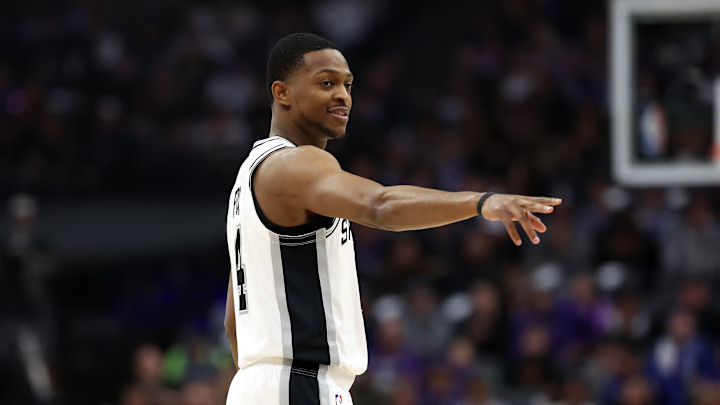This summer, several inner-conference OKC Thunder rivals have been rather busy as they try to bolster their squads to keep up with the defending champs moving forward.
The Spurs are now the latest team to take part in such a pursuit.
Monday, ESPN NBA Insider Shams Charania reported that San Antonio had agreed to extend last season's splashy trade-deadline acquisition, De'Aaron Fox, to a four-year, $229 million max deal, cementing their partnership through at least the 2029-30 season.
Although it may seem counterintuitive, the Spurs' decision to extend a former All-Star still in his prime is an extremely unwise maneuver that has the potential to tremendously benefit the Thunder.
Spurs extending De’Aaron Fox may have actually benefited Thunder
A player’s value is always tied to his cap hit.
For example, Phoenix owing $50,203,930 to Bradley Beal last season was cataclysmic, but Los Angeles signing him this summer at $5,487,850 per year is an outstanding transaction.
Fox is no different, and his value now tanks because of the hefty extension.
He will earn 30 percent of the salary cap in the 2026-27 season, followed by 30.9, 31.6, and 32.1 percent across the remaining three seasons.
Those percentages place him in the top 20 of dollars per year and are on par with Luka Doncic, Anthony Edwards, Cade Cunningham, and Tyrese Haliburton.
Essentially, San Antonio will pay Fox like a perennial All-NBA caliber player and borderline superstar – yikes! Sure, he’s an impactful player and likely threatens to make an All-Star appearance every season, but he’s not close to that stratosphere of guards.
A reasonable deal would have been roughly around a four-year, $177 million extension, which is 25 percent of the projected salary cap per season. That average annual value would be similar to Ja Morant, Darius Garland, LaMelo Ball, and Tyrese Maxey – appropriate comparisons for Fox.
The mammoth extension basically kills any chance of the Spurs moving on from Fox because no franchise is touching that contract in the second apron era.
Fox immediately becomes the next Zach LaVine or Bradley Beal in terms of talented players who earn far too much and, therefore, become a liability.
To make matters worse, there are legitimate concerns about Fox’s fit with the franchise.
He’s a downhill scorer who needs the basketball to be impactful and thrives as a rim threat and struggles to shoot from the perimeter. This exact description also applies to Stephon Castle and Dylan Harper, who are San Antonio’s best long-term pieces besides Victor Wembanyama.
Fox, Castle, and Harper do not complement each other in the slightest and will likely detract from each other’s strengths while emphasizing each other’s weaknesses. It’s a horrific pairing on paper, which makes the extension so puzzling.
Why commit this much money before seeing how Fox works with the young guys? On top of this, why pay the 27-year-old an amount that he assuredly would not have received from another team in free agency next offseason?
Instead of patiently building the roster around Wembanyama, Castle, and Harper, the typically astute Spurs front office obliterated any shred of financial flexibility by committing to Fox at this price.
It’s a great break for the Thunder because San Antonio represented the top long-term threat to OKC’s potential dynasty. The Spurs must now catch a few breaks and operate around a colossal contract that hinders their flexibility.
Plus, the Spurs loading up on rim-threats who cannot shoot effectively is a boon for the Thunder.
OKC’s defense is built around superb rim protection thanks to Chet Holmgren, Isaiah Hartenstein, and potentially Thomas Sorber. They surrendered the lowest field goal percentage in the restricted area last season and should continue to be a top team in this stat for many years to come.
If the Spurs want to center their offense on driving into the paint and sacrifice three-point shooting, then that’s completely fine with the Thunder.
Overall, there’s nearly no universe where Fox’s impact matches his salary, which means San Antonio’s flexibility is gone and the threat level to Oklahoma City is turned down a notch or two.
It’s yet another example that shows the gap between Sam Presti and the rest of the NBA.
